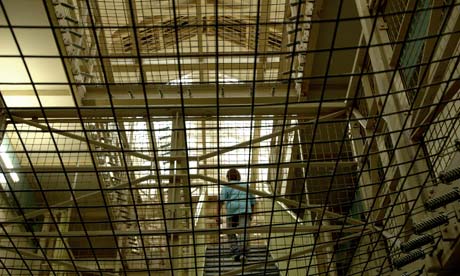
The blanket treatment by staff of the 10,300 Muslim
prisoners in England and Wales as potential terrorists risks creating
young men ready to embrace extremism on their release, the chief
inspector of prisons warns today.
Dame Anne Owers says the
treatment of the rapidly growing population of Muslim prisoners as
potential or actual extremists is prevalent throughout the prison system
despite the fact that fewer than 1% are in prison for terrorist-related
offences.
The chief inspector also voices scepticism over claims
by high security prison staff that gangs are forcing non-Muslim
prisoners to convert to Islam through
intimidation. Her report says that while conversions are common they are
more likely to be the result of better food at Ramadan, the benefits of
protection within a group and the discipline and structure provided by
observing Islam through prayer.
The report, published today, is
based on interviews with 164 Muslim prisoners in eight prisons and young
offender institutions, combined with prisoner surveys and inspection
reports over the past three years. The number of Muslims in prison in
England and Wales has soared in recent years from 2,513, or 5% of the
prison population, in 1994 to 6,571 or 8% in 2004 and to 10,300, more
than 12%, on the latest figures.
"There has been considerable
public focus on them as potential extremists and on prisons as the place
where they may become radicalised, often through conversion – even
though fewer than 1% are in prison for terrorist-related offences," says
the chief inspector's report.
But Owers says they are a far from
homogenous group: "Some are birth Muslims, and others have converted. In
prisoner surveys, 40% were Asian, 32% black, 11% white and 10% of mixed
heritage. One of their main grievances was, however, that staff tended
to think of them as a group, rather than as individuals, and too often
through the lens of extremism and terrorism – whether that was to
prevent, or detect, those issues."
The chief inspector says the
main finding from the surveys and interviews was that Muslim prisoners
report more negatively on their prison experience, and particularly
their safety and relationships with staff, than other prisoners. The
problem was most acute in high security prisons where three-quarters of
Muslims interviewed said they felt unsafe, which was strongly linked to
mistrust of the staff.
The one positive finding of the report was
that the strengthening network of Muslim chaplains meant that Muslim
prisoners are now more likely to have their faith needs met than other
prisoners.
Owers says a "pervasive theme" of their interviews and
reports was the lack of support and training provided to staff outside
of briefings that related to violent extremism and radicalisation.
"It
would be naive to deny that there are, within the prison population,
Muslims who hold radical extremist views, or who may be attracted to
them for a variety of reasons. But that does not argue for a blanket
security-led approach to Muslim prisoners in general," said the chief
inspector.
Owers says that without effective staff engagement with
Muslims as individual prisoners "there is a real risk of a
self-fulfilling prophesy: that the prison experience will create or
entrench alienation and disaffection, so that prisons release into the
community young men who are more likely to offend, or even embrace
extremism."
www.guardian.co.uk















0 comments:
Post a Comment